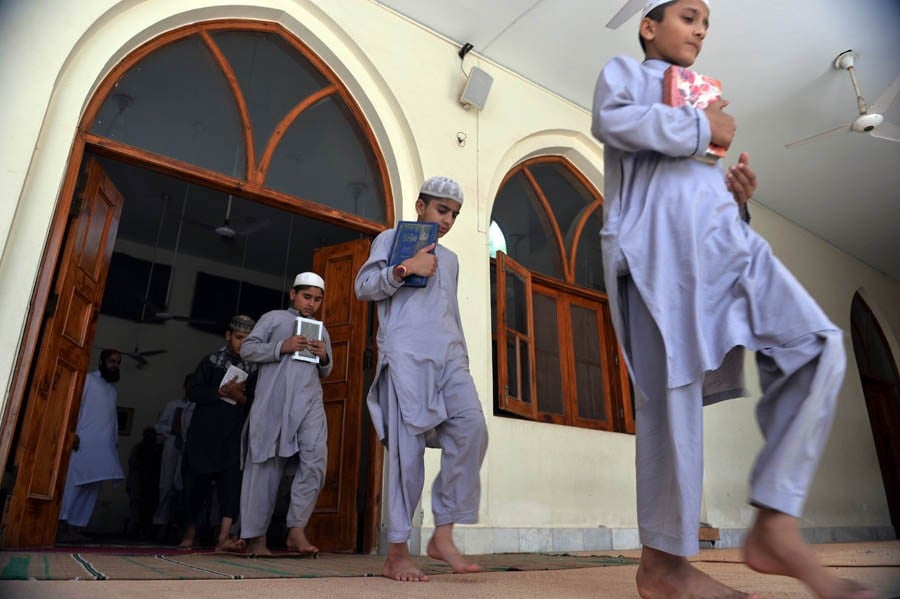
Prevention is far more efficient than de-radicalisation

It was in times of religious reformation (the second half of 19th century) that Mohammadan Anglo Oriental College Aligarh, Dar ul Ulum Deoband and Dara tu Nadwa at Lucknow sprang up as important reform centres. It was a time when Muslims were completely at a loss to grapple with the political decline, a newly emergent phenomenon they had not encountered thus far. All three Muslim empires had passed their prime by the beginning of the 19th century. Till that time, they had always been in the position of political ascendancy.
The Muslims, if we talk in intellectual terms, are stuck in that moment. Anyhow, in that fateful situation, the latter two institutions played a pivotal role in bringing political Islam to a pass through mobilising Indian Muslims in events like Kanpore Mosque incident, Italian atrocities in Tripoli but most important of them all, the Khilafat Movement, which shook the Muslims out of slumber.
But the point that I want to underscore here is the contradiction which has not been properly studied and therefore needs a fresh scholarly gaze to make better sense of it. Interestingly, the political impulse of the general Muslims pulled them to Turkey that was the centre of Khilafat. But, conversely, the religious sensibility acquired contemporaneously attracted them towards Arabia with whom the Muslim religious elite of the subcontinent had forged quite a strong nexus during the course of 19th century.
That dichotomy stills resonates in our national-historical narrative. When Ottomans collapsed after Kemal Ataturk annulled the institution of Khilafat, Muslim political imaginary ceased to exist; therefore, religion asserted itself as a complete code of life, politics being an integral part of it.
In some of my other writings, I have tried to understand the phenomenon emanating from the interface that Islam had with modernity through the concept of ‘arrested modernity’. In those writings I have argued that the Muslim reformers used modern (scientific) instruments to reinforce the religious tradition. Printing press, loud speaker and railway contributed significantly in the establishment of religious sway on the people. Later on, I had to revise my contention as I realised that the very tradition on which the whole edifice of contemporary Islam was built too was re-invented in the light of modernity. Islam in its nitty gritty was inflected by modernity in quite substantial terms.
With that context in view, when we analyse the question of religious radicalisation and its looming shadows on the Pakistani horizon, the religious sensibility that is at the heart of our ideology seems exclusionary and sectarian to the core; hence fissiparous in its very essence. The postcolonial Pakistan can at best be described as a nation state with its ideological foundations embedded in religion with a universal/international appeal. Therefore, instead of complementing each other, both religion and nation state are working at cross purposes.
That assertion appears loaded and needs to be dilated. My contention about Islamic ideology (you may read it as a system too) is that its growth and evolution happened in a peculiar circumstance provided by the empire system. Empire system mostly remained undefined (or fuzzy) but it afforded socio-religious flexibility as well as accommodation. It is only in such environment that the germination of ideas and their subsequent growth becomes possible.
The nation state as a political construct of the West has been incompatible with the socio-political ideology that Islam warrants. It can hardly be contained in the narrower confines of a nation state. Thus the scene is set to put two equally justifiable legitimacies to lock into dialectical struggle.
The religious ideology makes a (legitimate) claim that every Muslim is bound to help his co-religionist in distress, no matter where he/she belongs. Perceivably, it is obligatory on us as Muslims, if viewed from the religious perspective, to go and rescue our brethren in Kashmir or Palestine. Nation state, on the other hand, contains its operations and activities within the delineated and well-marked out frontiers.
National frontiers, in that particular case, are sacrosanct. In such a state, the clash of two diametrically opposite legitimacies becomes inevitable. The unresolved tension that accrues thereof, provides favourable condition for radicals who defy without any qualms, the sanctions and strictures which the nation state imposes. These radicals draw inspiration and legitimacy from the extra-territorial appeal that Islam epitomises. Ironically, Muslim scholarship has failed to work out any methodology whereby the two situations can be made compatible to each other.
In Pakistan, the state became vulnerable against religious ideology from 1980s onwards. Afghan jihad was the seminal of all factors, which exacerbated the clash between two different dispensations. The religious ideology kept on flourishing obviously at nation state’s expense. Infringement by Saudi Arabia, America and Iran, turning Pakistan into the battleground of their ideological warfare weakened the ‘state’ further.
Read also: Radicalisation and its context – I
The unresolved contradiction from within and intruders with their own vested interests (obviously from without) augmented the process of radicalisation. Mushroom growth of madrassas, religious exclusion and the spectre of sectarianism were significations of radicalisation which persist obdurately, in utter defiance to the state and its institutions. Radicalisation can be stemmed only by taking certain bold decisions. Decisive reforms in administration of justice and education are most important. School education in particular is of vital significance in this regard. National action programme must be revived and made effective.
Someone with an unusual insight once said and I quote, "I believe that preventing radicalisation is far more efficient than de-radicalisation, meaning stopping someone [from] joining is a lot easier than trying to pull someone out once they have joined. De-radicalisation begins by breaking down the logic which once seemed unassailable and rethinking what you are fighting for and why. That is hard to do when Islamists and Islamophobes feed off each other’s hateful clichés."
(Concluded)